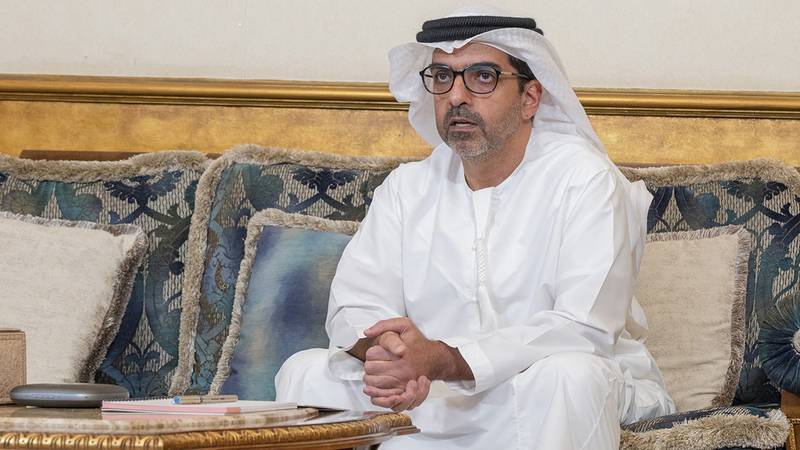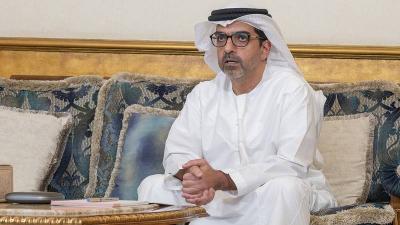Under the title "65 Countries and Global Organizations Facing Health Challenges at 'Expo 2020 Dubai'," Emirates Today reported that His Highness Sheikh Hamid bin Zayed Al Nahyan, a member of the Executive Council, attended the second Ramadan lecture of the Mohammed bin Zayed Council for this year, which was held remotely under the title "Enhancing Global Health and Safety... Our Health and Safety in Our Solidarity." During the lecture, Minister of State for International Cooperation, Reem Al Hashimi, emphasized that "there are many theories suggesting that the COVID-19 pandemic is merely a precursor to future pandemics." She pointed out that "Expo 2020 Dubai," being the first global event in the post-pandemic phase, will run for six months with global participation to address global challenges through initiatives and programs designed to spread ideas and solutions that will define the path of the international community. Sixty-five countries and international organizations will place health as a major subject on their agenda during "Expo 2020," seeking to create partnerships and contribute to the global dialogue concerning this sector and its challenges.
The lecture highlighted the importance of instilling values of solidarity, cooperation, and humanitarian compassion to achieve global health, along with the challenges facing health worldwide and the innovative initiatives and solutions that contribute to reaching the final mile of every stage of initiatives aimed at saving human lives from diseases and achieving desired goals swiftly. The session featured participation from Reem Al Hashimi, an epidemiologist and humanitarian activist Dr. Larry Brilliant, Dr. Maha Barakat, Director General of the "Fakhr Al Watan" office, Dr. Tariq Al Gurg, CEO of "Dubai Cares," Abdullah Al Gafli, Director of the UAE Project to Assist Pakistan, and Nassar Mubarak, Director of Strategic Affairs at the Abu Dhabi Crown Prince’s Court.
During the lecture, His Highness Sheikh Hamid bin Zayed Al Nahyan stated that everyone agrees that health is the most precious asset an individual possesses. He noted that thanks to God and the leadership, the health sector, both in terms of facilities and legislation, has become an essential part of development and progress in the UAE. He said, "The pandemic has proven that diseases and epidemics worldwide cannot be addressed without cooperation and collective action. Therefore, there is great hope for continuing international efforts to establish a strong groundwork for action, collaboration, and the exchange of experiences among nations to tackle any future health challenges."
A video was presented during the session showcasing the UAE's efforts and global humanitarian initiatives aimed at eliminating neglected tropical diseases and polio, and achieving the final mile to ensure the success of efforts in this field. Reem Al Hashimi mentioned, "130 million people were affected, and three million lost their lives due to COVID-19. The pandemic also targeted health systems worldwide, exposing their fragility, not just in terms of technology but also revealing the deep disparities and inequalities in healthcare service delivery." She added that "the pandemic has shown us that diseases threatening individuals' and communities' livelihoods, as well as their economies, are indicators of a greater challenge, which is reaching the last mile. There are many theories that suggest COVID-19 is merely a precursor to upcoming pandemics, being just one of the many global diseases that pose challenges to our health systems, threaten livelihoods, and weaken communities, affecting countries' economic prospects according to the World Bank."
Al Hashimi further stated, "The UAE has played a pioneering role not only in providing financial support but also in knowledge and skills, aiding through various international platforms, most notably Expo 2020 Dubai, which will serve as the first global event in the post-pandemic era, lasting six months with the world participating to address global challenges through initiatives and programs designed to disseminate ideas and solutions that will define the international community's direction." The minister added, "Just as past Expos have fostered discoveries and dialogues influencing humanity's path, Expo 2020 Dubai aims to present a sincere global vision based on facts that can open doors to opportunities for communities worldwide, particularly as 65 countries and international organizations have made health a primary topic on their agenda for Expo 2020, seeking partnerships and contributing to the global dialogue about this sector and its challenges."
His Highness Sheikh Hamid bin Zayed Al Nahyan posed a question during the lecture to Minister Reem Al Hashimi, asking, "Interest in international cooperation in health was relatively low during the spread of the COVID pandemic; how can we strengthen this cooperation and make it ongoing even after the pandemic?" The minister responded, "International cooperation during COVID-19 must be based on noble foundations and principles. Here in the UAE, every initiative launched was based on values of tolerance, coexistence, and brotherhood—values that define and shape the Emirati character. Amid a global crisis, the UAE, under its leadership's directives, sent 2,000 tons of medical aid to over 130 countries as part of its efforts to spread values of goodness, cooperation, and solidarity among people."
Additionally, His Highness Sheikh Hamid bin Zayed Al Nahyan posed another question regarding the general fight against smallpox and how to handle a pandemic like COVID-19 specifically. Dr. Larry Brilliant replied, "There are two types of lessons: the first are technical lessons learned from eradicating smallpox, and the second are human lessons. The technical lessons are that you cannot control an infectious disease unless you can identify its location and contain it. In the case of smallpox, which is easily recognizable due to its appearance on the face, you can respond by isolating individuals and providing their needs for money and food so they don't have to leave isolation, after which you can vaccinate them. This reveals the epidemiological lesson that vaccination is vital, as is the necessity for rapid response."




